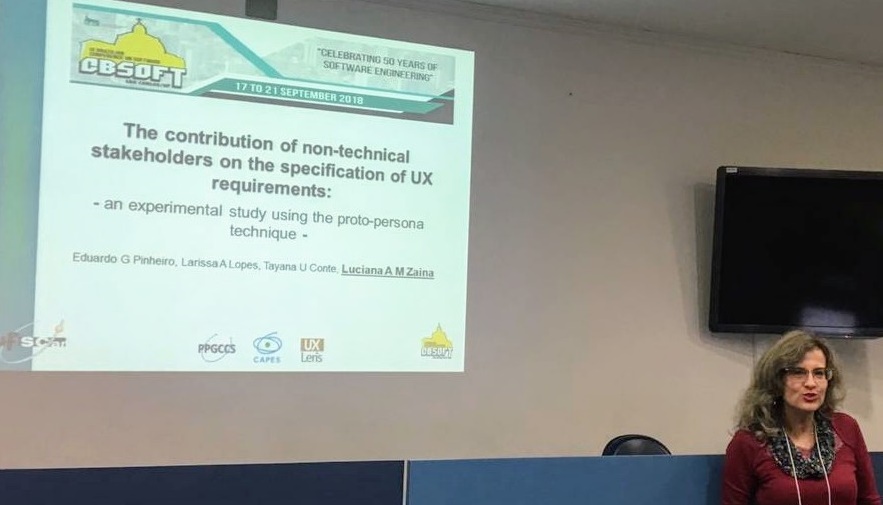
The relevance of these results was recognized during the Brazilian Symposium on Software Engineering (SBES) this year, which awarded an article resulting from the master's research by computer scientist Eduardo Gouveia Pinheiro, developed from 2016 to 2017, in the Post-Graduate Program. Graduation in Computer Science (PPGCC-So) at Campus Sorocaba, UFSCar.
The paper discusses the importance of taking the target audience to the software development process, highlights Professor Luciana Zaina, from the University's Department of Computing (DComp-So), who guided the master's research and is one of the co-authors of the article . "Today we talk a lot about collections with the end user, about specifying the user's needs etc. And this work goes beyond the barriers of this discussion and brings the end user - non-technical public - to be a participant in the product specification", explains Zaina , highlighting that it is the end user himself who dominates the knowledge about the needs related to the product and what are its applications.
Within the various stages of software development, the research focused on the so-called "requirements elicitation", a phase that investigates both the functional requirements and the user experience. "The requirements are all the needs of a given project: functionalities, modes of operation, meeting specific expectations, technologies employed etc. During this phase, a requirements engineer uses several techniques to raise all the needs of the software in order to provide a basis for its planning ", describes Pinheiro.
To bring the vision and needs of users in the development of software, the study used a technique known as "Proto-persona", a variant of another more famous technique called Persona. "Personas are fictional characters that represent groups of real individuals. These personas are an instrument of empathy and understanding, so that software developers can better understand the user for whom they are developing a certain product and, thus, serve it satisfactorily", defines Pinheiro.
Based on this technique, the researchers carried out an experimental study with the participation of two groups of partners, including five technicians in the area of Software Engineering and eight non-technicians. "Through the creation of proto-personas, it was possible to evaluate what types of characteristics and requirements that each type of [public] stakeholder found relevant for the creation of educational software", explains the researcher.
"What we could see is that the two groups of stakeholders - technicians [software engineers] and non-technicians [educators] - were important in the product specification process", evaluates Zaina. Pinheiro illustrates one of these contributions. "For example, during an analysis of how to get students to continue using a particular application, it was possible to note that educators focused on aspects of student fun, while software engineers focused on potential mechanics to prevent the student from being frustrated with the use of technology. In other words, with the same objective, both stakeholders suggested different and complementary ways to encourage students to continue learning through that application ", details Pinheiro. Thus, the study concludes that both were able to contribute in detail about the requirements of the user experience in the artifact, however, in different and complementary perspectives.
Awards
The consistency of the results led the article written by Pinheiro and Zaina to the 3rd best award in the research track of the Brazilian Symposium on Software Engineering (SBES), an event that is part of The Brazilian Conference on Software (CBSoft). "SBES is already 32 years old and has a rigorous process of evaluation and publication of works, with an acceptance rate of 20%. This year, only 16 papers were accepted", indicates Zaina.
According to the professor, the review of SBES articles is very thorough and considers the contribution of the work to the area of Software Engineering. The SBES received around 75 submissions for the research trail, of which 16 were accepted. "A committee with three researchers selected the seven best articles, among those that were accepted and, of these, elected the three best," she says.
The award-winning UFSCar article also counted on the contribution and co-authorship of Professor Tatyana Uchôa Conte, from the Federal University of Amazonas (Ufam), and the master from PPGCC-So Larissa Lopes, who assisted in the experiments and discussions. The article "The contribution of non-technical stakeholders on the specification of UX requirements: an experimental study using the proto-persona technique" can be accessed at the link https://bit.ly/2Qu6kyn.












